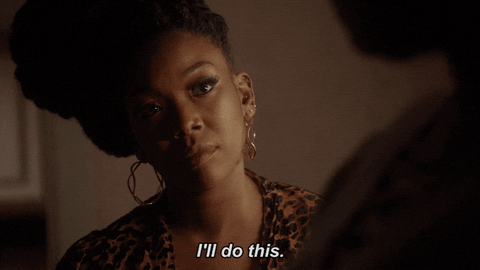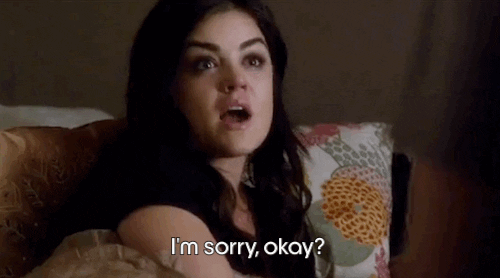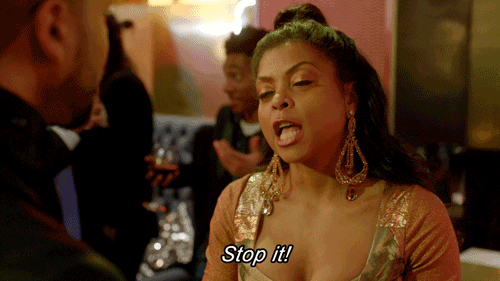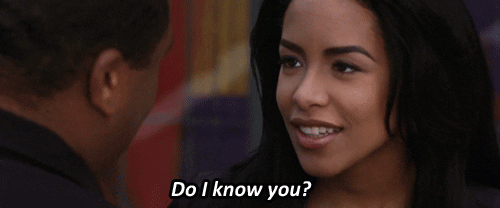
I'll be honest. When it comes to a lot of the content that I write, on some level, I am able to personally relate to the topic. People-pleasing, though? Eh. Not so much. If anything, I'm a recovered-codependent-anti-people pleaser which comes with its own pros and cons, believe you me. At the same time, I do have a close friend who is a self-professed people-pleaser. We talk about it fairly often. "It" being how, on the surface, being a people-pleaser seems like a selfless way to live your life. But man, when a people-pleaser shows clear signs of being super needy, a doormat or the kind of individual who constantly has their kindness mistaken for weakness, that can be a really hard—and counterproductive—way to live your life.
Take my friend's marriage, for example. She's a people-pleaser while her husband is semi-controlling. Yeah, I know that semi-controlling is almost as contradictory as being "a little pregnant"; the reason why I phrased it that way is because he's not so much abusive as he just…he doesn't really get how to be in a partnership. He likes to run the show and, since she's a people-pleaser, sometimes he has to be reminded that his wife is not his child. It's taken years of therapy for them to strike up a balance between both "vices".
It's actually because of what she sometimes has to go through that I was inspired to pen this piece. Because again, although people-pleasing may seem altruistic on the surface, at the end of the day, all it really ends up doing is depleting you of time, energy and, to a certain degree, your very best self.
How can you know for sure that you are a people-pleaser? See if you can personally relate to the following seven signs. If so, that is definitely your starting point onto the way towards healing and recovery.
You Take Responsibility for Other People’s Stuff

She talks crazy to you and you apologize to her for it. He breaks another date and somehow you find a way to make it be your fault. Your boss doesn't finish their part of a project (for the fifth time, mind you), so you stay late to complete it and still let them take the credit. These are just a few examples of what it means to take responsibility for other people's stuff. To a people-pleaser, it's usually done to either keep the peace or so that the person who should be held accountable will appreciate or like them more. But usually, all it does is put the pleaser in the position of being taken advantage of or being treated like a doormat. Because, as the old adage goes, "People do as much as you allow them to."
How to Stop This Habit: A responsible human being is accountable for their own actions. You know what else they are? They are someone who makes sure to hold others accountable for their actions as well. If someone gets out of pocket in how they communicate with you, tell them. If ole' boy has already broken off a couple of dates, let him know that you're good with taking a pass on the next one. Your boss? Hold a meeting with them to go back over your job description. If they blow you off, as I always say, just about every boss has a boss. Report 'em. It's one thing to grant someone a little mercy and grace when they mess up, but that doesn't mean that there shouldn't also be consequences for their actions; especially when the actions are repetitive. Real talk, some people do not learn any other way.
You Freak Out When Others Are Upset with You

I don't know anyone who really likes to have someone upset with them. Well, gaslighters and folks that like to kick up drama do; hopefully, you are self-aware enough to keep a lot of them out of your personal space. Anyway, another sign of being a people-pleaser is you get really upset when someone else is upset with you. This tends to happen if you tell them "no" and they get mad. Now you're all shook up. Or you tell them something about themselves that they don't want to hear, they pull back a little and now you're imagining worst-case scenarios about y'all's relationship. Or—and these folks are the worst—someone is passive-aggressive or suddenly giving you the silent treatment and you can't sleep or are a total wreck over it.
This is kind of a weird sign of being a people-pleaser because, low-key, it's got some controlling tendencies attached to it. When you get upset because someone is upset with you, it's kind of like saying that you are mad or hurt because they expressed how they felt about something. It's like you are taking in their energy just because you don't want them to have a particular emotion in the first place. But remember, they have a right to feel, however it is that they do. Let them. Oh, and try not to make their emotions a bigger issue than it is. If they are upset, give them the space to process. Don't look at it as being any deeper than that…unless or until they tell you otherwise.
How to Stop This Habit: Own what's yours. Let them own what's theirs. What I mean by that is it takes a lot of maturity and emotional intelligence to know that no one really and truly has the power to make anyone feel a certain type of way. So, if someone in your life is upset because of something that you said or did, yes, be caring enough to address it and hear them out. But always remember that you don't have to get all in shambles about it. More times than not, all that tends to do is make matters worse in the long run.
You’re Constantly Apologizing (Even When It’s Not Your Fault)

Off top, I think the reason why a lot of people apologize for things that aren't their fault is it probably is connected to something in their childhood. Children are so innocent and resilient in the way that they love that a people-pleaser who was around a lot of abuse or turmoil, they might've said "I'm sorry" in hopes that it would immediately make things better. Another scenario could be something that one of my friends (who is a self-professed people-pleaser) once told me. She said that she apologizes a lot because she feels like when someone is disappointed, somehow, even if it's just a little bit, it has to do with her.
While it's admirable to be humble enough to apologize when you do need to take ownership for your actions, the problem with apologizing for things that aren't your fault is you take on responsibilities and burdens that you shouldn't own; even if it's just in your own mind. Before long, that can really start to take an emotional toll on you. Or it can do what the title of an article says that it can—"Stop saying 'I'm sorry.' Research says it makes others think less of you—here's what successful people do instead".
How to Stop This Habit: When it comes to breaking this particular habit, first, stop saying "I'm sorry." Even when something is your fault, you should stop doing that. You are not "sorry"; you apologize. And if you're trying to break the habit of apologizing when it's not your fault, before you allow those words to come out of your mouth, stop and think about if whatever it is that transpired really is connected to something you did do or should have done. If it doesn't, don't apologize. None of us is perfect. You'll have plenty of opportunities to take ownership for things that you did do wrong (or could've done better). Don't unnecessarily stress yourself out by also piling on words and actions that, at the end of the day, have absolutely nothing to do with you.
You’re Non-Confrontational. To Your Detriment.

Being non-confrontational is soooo not a part of my personality wheelhouse. I'm the kind of person who is more in the lane of "The sooner we get this thing addressed, the sooner we can move on to what's next." Next. But I know some people who are the opposite of me. When something or one bothers them, they will bite their tongue or suppress their feelings. In their mind, they think that it's "keeping the peace". But if it's at the cost of them being happy, toxic patterns never changing or even their health being at risk, how peaceful is it?
How to Stop This Habit: If you know that this is your biggest trait when it comes to being a people-pleaser, my first recommendation would be to read articles like "How Being Non-Confrontational Has Held Me Back in Life", "The Hidden Cost of Being Non-Confrontational" and "6 Ways To Conquer The Fear Of Confrontation", just so you can see how much it is actually costing you.
Now, I'll be the first to say that being confrontational should not mean that you should go on the attack, say everything that's on your mind or that you should be rude or mean. As India.Arie once said, as you're mastering the art of confrontation, you will have moments when you'll need to learn how to come "Back to the Middle" between saying nothing and being "on 10" all of the time. But the more that you learn the value in your voice, the more you'll be able to find ways to please yourself as much as you're trying to please others too. There will be a balance and balance is always good.
You’re Scared to Set Boundaries

A violation of boundaries. Chile, I just recently had this happen to me. Anyone who knows me knows that if there is something that is an ultimate pet peeve, it's showing up at my place unannounced. I don't think it's cute or sweet or anything of the sort. Well recently, someone who I explicitly told not to did. Not only did they come but they tried to regulate what I said in response to them doing so. They had already pushed it way too far by showing up at all, but when they tried to dictate my reaction, my immediate response was, "It's time to get out." I don't feel the least bit bad or guilty about it either because my home is my place of peace. Not only were they not invited to my home, they brought any and everything but that into it. Plus, they straight up violated a boundary which is the epitome of disregard and disrespect.
If you're a people-pleaser, you probably read that and was like, "I could never put a person out of my house." Instead, you probably would've kept letting the drama ensue. That's because people-pleasers don't really get the concept of boundaries; especially when it comes to setting some. But trust me, boundaries, even if they are uncomfortable at first, are one way for you to develop a backbone while setting limits for yourself so that you know how to make the most of your time, effort and even emotions.
How to Stop This Habit: I plug this book often because that's how bomb it is. Boundaries is something that I think every person should have in their personal library. It's a read that serves as a great reminder that boundaries are healthy, necessary and beneficial to every human being. It's all about setting limits and then enforcing them to people who try and push past them. In learning how to set my own boundaries and respect the boundaries of others, I have learned, firsthand, that boundaries are a form of respect. I've also learned that once boundaries are clearly made and they are ignored, that is a form of disrespect. A lot of people-pleasers are very unhappy deep down inside because their lack of limits (boundaries) result in them being disrespected time and time again. There ain't nothin' helpful or beneficial about that.
You Tolerate Abuse. Any Form of Abuse.

When it comes to abuse, there are other kinds besides the physical. You can be emotionally, mentally, financially, sexually (this includes if you're in a relationship with someone and they force you to do something that you don't want to do) and even spiritually abused. Another form of abuse is abandonment or neglect. Unfortunately, when it comes to abuse, people-pleasers are oftentimes the victim of it.
There are a few reasons why. One is because a lot of people-pleasers are compassionate individuals; they are more concerned with helping the person through their abusive traits than protecting themselves. Another reason is that they are horrible when it comes to boundaries. Oftentimes this is because they weren't properly taught them while they were growing up. Another reason is because they believe that if they love someone enough, give to someone enough, and tolerate their poor behavior long enough, the person will change. Actually, the reality is, that abusers can only change when they want to. And, it's best for them to do it when they are working on things with a therapist, not via a relationship.
The really sad thing about a people-pleaser is folks who can see what is transpiring aren't always able to pull a people-pleaser out of the mire. That's because, if they're not careful, something else that people-pleasers have a tendency to become are mini-saviors. They want to "save" their abuser rather than release them so that they can learn how to stand on their own two feet.
How to Stop This Habit: One of the best things for this kind of people-pleaser to do is to get into their own therapy. There's a pretty good chance that the reason why they tolerate abuse is either because they don't think they deserve better or they were in a toxic situation while growing up; the kind that made them think that they were supposed to "grin and bear" through abuse with their own relatives. The reality is when a people-pleaser is involved with an abuser, it takes a lot of work to break the habit. Almost as much as the abuser needs, to be honest with you.
You’re a Chameleon

Chameleons are fascinating; at least they are to me. Although they tend to think that they are flexible and adaptable to their surroundings, what they really come across as being, more times than not, is disingenuous. Oh, and inconsistent. While they are with their church-going crowd, they are one way. When they are with their friends, they are another way. When they are alone, they are someone else. It's almost like they have multiple personalities. Like I said, they're fascinating individuals. (If you want to dive deeper into what a chameleon is like, check out "The Social Chameleon Personality: Traits, Pros, Cons, And More".)
Some people? They're chameleons because for them, it's a form of hustling. They change themselves into whomever they need to be in order to get whatever it is that they want from someone else. Then there are those who are that way because they want to please whoever they are around at the time. They want to be accepted and liked so much that if they've got to "switch up" in order to get along, they'll do that.
Hmph. The problem with being this kind of people-pleaser is if you're out here always accommodating others, when do you possibly get around to figuring out who is at the core of your being so that you can know what you like, need and want in order to live your own best life?
How to Stop This Habit: This one is pretty simple. Be yourself. Everywhere you go. Take out a month and be intentional about being the same person in every circle that you're in. I won't lie to you, if you've never done that before, you might go through a bit of an identity crisis. Work through it by spending more time alone, taking personality tests and even asking some of the nearest and dearest to your heart just how they perceive you—the good, bad and indifferent.
The more time you spend getting to know you at your core, the more you'll be able to silence the chameleon, feel confident that people like you for your real self and you won't have to go through all of the internal upheavals that come with always changing who you are in order to please others. Whew, chile. Talk about freedom!
Want more stories like this? Sign up for our newsletter here and check out the related reads below:
The Art Of Saying "No" To Things You Don't Want To Do
6 Signs You Are WAY Too Self-Critical
Self-Truths That Will Stop You From Settling For Less
Allow These Things To Happen Before Calling Someone "Friend"
Feature image by Giphy
- On Being A Recovering People-Pleaser... - xoNecole ›
- Zendaya On Learning To Stop People-Pleasing & Start Trusting Her ... ›
- Being A People-Pleaser Taught Me The Power Of The Word "No ... ›
- How to Stop Being a People Pleaser - YouTube ›
- 6 Ways to Stop Being a People Pleaser at Work - The Muse ›
- 6 Steps to Stop People Pleasing and Start Doing You | Science of ... ›
- How to stop being a people pleaser ›
- 5 Tips to Help You Stop Being a People Pleaser ›
- How to Stop Being a People Pleaser ›
- 5 Practices That Helped Me Stop Being a People-Pleaser - Tiny ... ›
- How I Learned to Stop Being a People-Pleaser | Psychology Today ›
- 21 Tips to Stop Being a People-Pleaser ›
This Is How To Keep 'Holiday Season Stress' From Infecting Your Relationship
Hmph. Maybe it’s just me, but it seems like there is something really weird happening in the fall season air (because winter doesn’t officially begin until December 21) that cuddle season is in full swing while break-up season is as well. In fact, did you know that break-ups are so popular during the holiday season that December 11 is deemed Break-Up Day?
The reasons why relationships shift around this time vary; however, I did both roll my eyes and chuckle when I read that a very popular one is because it’s an easy way to get out of getting one’s significant other a Christmas present. SMDH.
Anyway, I personally think that the less shallow folks out here may contemplate calling things “quits” or they at least distance themselves a bit from their partner (and what I’m referring to is serious relationships) due to all of the stress and strain that oftentimes comes with the holidays whether it be financial, familial, due to their tight schedules or something else.
Listen, I would hate for you and your man to miss the fun and happiness of experiencing this time of year, all because you are so overwhelmed or irritated that you can’t really enjoy it. That’s why I have a few practical tips for how to avoid allowing the typical holiday season stress from INFECTING your relationship.
Manage Your Expectations
 Giphy
GiphyUnmanaged expectations. If there is a main reason why the holiday season tends to be so stress-filled for so many people, I’d bet good money that this is the cause. And when you’re in a long-term relationship, expectations can manifest themselves in all sorts of cryptic and/or unexpected ways. You might have relatives who assume that you are going to be with them for Thanksgiving or Christmas when you have other plans in mind. You might be thinking that you are going to spend one amount for presents while your man is thinking something totally different. When it comes to scheduling, your signals may be crossed.
And you know what? To all of these scenarios, this is where clear and consistent communication come in. Don’t assume anything. Don’t dictate anything either. From now until New Year’s, mutually decide to check in once a week, just to make sure that you are both on the same page as it relates to the holidays and what you both are thinking will come along with it. The less blindsided you both feel, the less stressed out you will be. Trust me on this.
Set (and Keep) a Budget
 Giphy
GiphyOkay, so I read that last year, 36 percent of Americans incurred some type of holiday-related debt. Hmph. Last year, there was still some sense of normalcy in this country, chile, so I can only imagine what finances are gonna look like over the next several weeks. That said, since I don’t know a lot of people who don’t find being broke stressful, make sure that you and your bae set a budget and then stick to it this year — no ifs, ands or buts.
Because really, y’all — it doesn’t make sense to deplete savings and/or max out credit cards for a few days of giggles only to be damn near losing your mind because you don’t know how to make ends meet come Dr. Martin Luther King, Jr. Day.
And by the way, this tip doesn’t just speak to things like food and gifts; I also mean travel. If it doesn’t make a ton of sense (or cents) to be all over the place this year — DON’T BE.
Keep Matthew 5:37 at the Forefront
 Giphy
GiphyIf off the top of your head, you don’t know what Matthew 5:37 says, no worries, here ya go: “But let your ‘Yes’ be ‘Yes,’ and your ‘No,’ ‘No.’ For whatever is more than these is from the evil one.” That verse right there? Oh, it’s a boundaries lifesaver! I say that because do you see “maybe” or “I’ll think about it” in there? Nope. LOL. It says that you should tell people “yes” or “no” and leave it at that — and that complements Anne Lamott’s quote, “’No’ is a complete sentence” impeccably well. Yeah, you’ve got to remember that anything beyond a yes or no to a request is privileged information; you don’t owe anyone details or an explanation.
Besides, if you are really honest with yourself, when someone asks you something and you give a “Umm, let me think about it” kind of reply, more times than not, you already know what your answer is going to be — so why not let you both off of the hook? Give your response. Commit to that. And let everyone (including yourself) get on with their lives and schedules.
I promise you that when it comes to those holiday parties, you are pissing more folks off by not RSVP’ing or doing so and not showing up than just saying, “Thank you but not this year” off the rip.
Remember That Your Personal Space Is Privilege Not a Right
 Giphy
GiphyA friend of mine recently bought a new house and invited me over to come see it. He’s a single man with no children, so as I was taking in all of the space that he had, especially as I walked through his finished basement, I joked about relatives coming to live with him. “Hell no” and “absolutely not” were pretty much his immediate responses as he went on to say that some folks even had the nerve to be offended when he told them that he had no intentions on taking DNA in.
Ain’t it wild how people think that your stuff is their right? And yes, that brings me to my next point. Your home is your sanctuary space. If you want to host folks this year — cool. If not, ALSO COOL. Please don’t let folks (family included) guilt you into how they want you to act or even into what they would do if the shoe was on the other foot. You are not them — and as one of my favorite quotes states, “If two people were exactly alike, one of them would be unnecessary.” (A man by the name Larry Dixon said that.)
Hell, my friends? They know that I am good for sending them random things that they need or even want all throughout the year. Coming over to hang out at my pace, though. Uh-uh. Chalk it up to being a card-carrying member of the ambivert club yet I like keeping my living space personal — and I sleep like a baby, each and every night, for feeling that way.
Always remember that your space, your time, your resources, your energy and shoot, yourself period (including your relationship), are all things that are your own. You get to choose how, when and why you want to share them. The holiday season is certainly no exception.
Cultivate Some “You Two Only” Traditions
 Giphy
GiphyIt’s not uncommon for some couples to hit me up after the holiday season to “detox.” Sometimes it’s due to the financial drama (and sometimes trauma) that they experienced. Sometimes it’s because they allowed their relatives (especially in-laws) to get more into their personal business than they should’ve. More than anything, though, it tends to be because they didn’t get enough quality time together and so ended up feeling “disconnected.”
Please don’t let that happen. Listen, I’m not even a holidays kind of woman and yet, I will absolutely sit myself down with some hot chocolate and chocolate chip cookies to enjoy a Hallmark holiday film or two. Aside from the fact that most of them are lighthearted and sweet, I also like that they usually focus on couples loving on each other amidst all of the holiday beauty and ambiance — which is something that all couples should set aside some time to do.
Maybe it’s a vacation. Maybe it’s a staycation. Or maybe it’s my personal favorite, A SEXCATION. Whether it’s for a few days, the weekend or even overnight — don’t you let the holidays go by without setting aside time for you and your man to celebrate one another. Don’t you dare (check out “Are You Ready To Have Some Very Merry 'Christmas Sex'?”).
GET. SOME. REST.
 Giphy
GiphyI once read that 8 out of 10 people get stressed out over the holidays and 3 out of 10 lose sleep during to it — and when you’re stress-filled and sleep-deprived, that can absolutely lead to hypersensitivity, making mountains out of molehills and even not being in the mood for sex.
Your relationship can’t afford to go through any of this, so definitely make sure to prioritize rest. I don’t care how unrealistic it might seem during this time, sleep should never be seen as a luxury; it will always and forever be a great necessity.
That said, try to get no less than six hours of shut-eye in (check out “6 Fascinating Ways Sex And Sleep Definitely Go Hand In Hand”) and even ask your bae to take a nap with you sometimes (check out “Wanna Have Some Next-Level Sex? Take A Nap, Sis.”). Not only will sleep help to restore your mind, body and spirit but, when it’s with your partner, it’s an act of intimacy that can make you both feel super connected, even in the midst of what might feel like chaos.
___
Holiday season stress is real. Still, never give it the permission or power to throw your relationship off. Put you and your man first and let the holidays be what they are gonna be, chile.
Let’s make things inbox official! Sign up for the xoNecole newsletter for love, wellness, career, and exclusive content delivered straight to your inbox.
Featured image by Shutterstock
'Constant Reassurance' Is The Relational Orange Flag No One Wants To Address
Read more than scroll. Boy, if there is a motto that I would encourage people to implement, now more than ever in their life, it would be how important it is to read (actual books, researched data and fact-based information) over merely scrolling via social media. Because boy — every time I look out on apps to see what folks are talking about, I don’t know if I’m impressed with or appalled by how many nothing-more-than-emotionalized opinions are so boldly stated when, after five minutes on Google, it’s clear that there are virtually zero facts to back them up.
Not to mention the fact that so many folks literally don’t read (you know, past skimming) anymore — and yes, I have stats to prove it. I recently read that back in 2022, reportedly, a little over 48 percent of people read one book over the course of that entire year (that is not a good thing and proves that book reading is on a steady decline). Meanwhile, the amount of time that is spent on social media: 2.5 hours on a daily basis. That’s 150 minutes of listening to folks just say…whatever. And if you listen to it long enough, you could actually start believing it as gospel.
This includes what I am going to touch on today: the belief that if someone really cares about you, they should constantly reassure you. Y’all damn near are gonna have me join the world of social media again, just to address this one fallacy. For now, though, I’ll settle for making some points via this article — because as you can see from the title, I don’t agree with that conclusion at all.
In fact, I personally believe that thinking this way is a pretty big relational orange — if not red — flag.
Reassurance. And What It Does for a Child.
 Giphy
GiphyIf you’ve read enough of my content, you know that I am big on word definitions — and when it comes to the word “reassurance,” the meaning alone explains why this article has the title that it does:
Reassurance: something, such as information, praise, or an action or gesture, that soothes, comforts, or restores to confidence
Reassurance restores confidence. Bookmark that, please. I will certainly circle back to that point before I am done.
Okay, so when it comes to, say a child, there is absolutely a place for reassurance. That’s because they are still in the process of significant self-development and so they need reassurance in order to feel safe, secure and loved. It’s also a way for them to establish trust in others.
However, did you know that many mental health experts say that if a child deals with, say anxiety, constant reassurance can actually be counterproductive because they can start to rely on external validation to emotionally stabilize them instead of learning how to remain calm and relaxed on their own (yeah, bookmark that too)? Some other ways that constant reassurance can become potentially problematic is it can cause kids to create problems that don’t exist, to overthink and to jump to the wrong conclusions (hmm…very interesting).
And so, already, we’re seeing something pretty interesting, right? Although reassurance has its place, too much of it, even for kids, typically ends up doing more harm than good.
Let’s keep building.
How 'Lack' As a Child Can Manifest As an Adult
 Giphy
GiphyOkay, so we just touched on how constant reassurance can be counterproductive for an anxious child. Now what about when that child grows up? If they never learned how to properly and effectively deal with their anxiety, what then? Well, this is where attachment styles can very easily come into play — especially since one of them is literally called “anxious attachment style.”
Anxious attachment style is rooted in insecurity. It typically stems from experiencing the type of dysfunctional upbringing that resulted in one or both parents being unpredictable or inconsistent in their caregiving approach and techniques. As a result, the child deals with things like fear of abandonment or rejection and, without healing from that, they become an adult who is pretty much the exact same way.
In relationships, it can manifest in them being extra clingy, codependent, super jealous, controlling or — catch it — someone who is always looking for validation and reassurance.
Hmph. Did you catch that? Did you really catch that? Needing constant reassurance in a relationship IS NOT something that should automatically come with a relationship. In fact, if you’re someone who has this type of need or even expectation, there’s a really good chance that what you actually need is therapy — not for your partner to work harder to make you feel better about yourself or the relationship.
Which brings me to my next point.
Relationships Can Be Therapeutic. They Aren’t Therapy, Though.
 Giphy
GiphySomething that some of my clients will tell you that they’ve heard me say, more than once I might add is, “PARENT and PARTNER are not palindromes.” A palindrome is a word (line, sentence, etc.) that is the same whether it is spelled backwards or forwards — and while, of course, parent and partner couldn’t qualify as being that, what I mean is there are far too many people who think that partners should pick up where parents left off and/or dropped the ball — and that is a super unhealthy approach to relationships. Come to think of it, not only is it unhealthy but really unfair as well.
This is exactly why I’m not big on phrases like “the princess treatment” in adult relationships. A princess is the daughter of a king while a queen is the wife of one. For a grown woman to expect a man to do what a father did for her as a child without accepting that as an adult, there are far more responsibilities as a wife that comes into play? Yep, that is toxic thinking.
And you know what? So is expecting your partner to overcompensate for where your father and/or mother didn’t show up in the way that they should have. That is not your partner’s fault, their role or their assignment while dating you. If you feel otherwise, it really is time to speak with a professional who can help you to do a bit of “reprogramming” in your thinking because, for you to feel and/or assume that since your parents didn’t make you feel confident and secure or teach you how to value yourself, your partner should work overtime to make up for it? There is not one thing that is healthy, mature or emotionally solid about having that type of mindset.
And that is why I am also good for saying that, although relationships can be therapeutic (healing), they should never EVER be seen as therapy. Therapists are trained to deal with the mental and emotional challenges that people have. On the other hand, no one should expect their partner to have the knowledge and expertise that professionals do — and while we’re here, partners also shouldn’t trust that someone who needs the assistance of a therapist to become whole (again) would know exactly what steps are required for that to happen.
So yeah, if you’re someone who thinks that being loved means that someone needs to constantly make you feel good about yourself or secure in the relationship — you probably do have an anxious attachment style. See a professional to get that confirmed, though. Because no one should have to make you feel valued or worthy. That is an inside job.
And this brings me to my final point.
It’s Not Fair to Want Someone to Love You More than You Do
 Giphy
GiphyFor this last point, something that Christ once said immediately comes to mind:
“No one puts a piece of unshrunk cloth on an old garment; for the patch pulls away from the garment, and the tear is made worse. Nor do they put new wine into old wineskins, or else the wineskins break, the wine is spilled, and the wineskins are ruined. But they put new wine into new wineskins, and both are preserved.” (Matthew 9:16-18 — NKJV)
A lot of times, Christ spoke in parables because it was easier for people to get where he was coming from (Matthew 13:13). Anyway, along these lines, what would be the point in pouring a liquid into a bottle that has a hole in it? It’s not built to contain and maintain the fluid and so, no matter how delicious the drink may be, no matter how many times it’s poured into the bottle, the bottle is never going to remain full — because it has cracks in it.
BOOKMARK THAT.
My fourth baby’s daddy (check out “Why I Named The Children I Aborted”), while we were in the process of our “exit interview” (which is what I choose to call it) of our dynamic, he said something that has always stayed with me: “Shellie, your biggest problem is you receive compliments are revelations when they should be seen as confirmations.” Hmph. The irony of HIM saying that is kind of a trip and yet, at the time when we were experiencing each other, he was exactly right. I should’ve never had such a low sense of self-worth that whatever a man said to me had me so in awe that I either felt extremely grateful or became super addicted to his validation.
And y’all, that is exactly what needing constant reassurance looks like — because why does someone need to keep telling you that you are beautiful, keep saying that you are wonderful, keep letting you know that they want to be with you — keep restoring your confidence in yourself and in your relationship with them?
In other words, why should they work harder at making you feel good about yourself and solid in your relationship than you are willing to? Isn’t that just like pouring liquid into a broken bottle?
There is someone in my family tree who I had to distance myself from because he kept venting to me about his marriage and the fact that his wife was just like this. Sadly, it was never (and I do mean NEVER) enough that he chose her — whenever she felt some type of way about herself, here she came looking for him to fill her voids. After a couple of years of the nonstop needs for reassurance, he was worn out from doing it and I was exhausted from hearing about it. He was too scared to call her out and she was too unaccountable to get the real help that she needed. Whew. Toxic on top of toxic.
So Shellie, what are you saying — that we shouldn’t expect compliments, affirmations, support and encouragement in our relationships? Chile, if that is what you got out of this, you are choosing to think that way because that couldn’t be further from where I am coming from.
Again, you’ve got to remember what reassurance means: it’s about restoring confidence. A compliment is “an expression of praise, commendation, or admiration” yet if you already know that you are pretty, smart, funny, whatever, someone telling you that isn’t “building your confidence;” it’s cosigning on something that you are already aware of. Encouragement is about inspiring or stimulating someone and so yes, of course, the right partner is going to want to see you win in life and so they are going to offer up influence and motivation to help you — but what if they aren’t there?
Shouldn’t you be able to encourage yourself? ABSOLUTELY. However, expecting them to restore your confidence due to things that have nothing to do with them or because you simply lack self-confidence? That is not how relationships are to go. If you aren’t sure of yourself (which is a foundational definition of confident), get to the root of why and then figure what you need to do to become sure — that way, your partner doesn’t have to constantly “fill you up;” actually, what they do will be surplus instead of void-filling because your “bottle” will be unbroken.
____
I’m telling you, if you pay attention to the relationship side of socials, at least twice a day, someone will talk about how they think that a relationship should entail receiving constant reassurance. Lies on top of lies. No one should think that love means trying to make someone else feel sure about themselves because they don’t know how to do so on their own.
And this is why I say that expecting constant reassurance is an orange, if not red, flag.
Because when you already feel good about yourself, there is no need.
And if you don’t, figuring out how to is an inside job — FIRST.
Let’s make things inbox official! Sign up for the xoNecole newsletter for love, wellness, career, and exclusive content delivered straight to your inbox.
Featured image by Shutterstock









